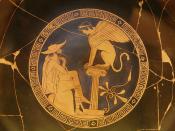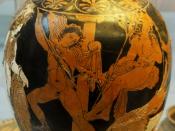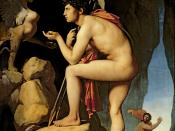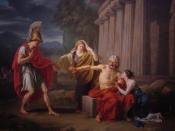In Sophocles' mythic story of murder, incest, and deceit, Oedipus Rex, the main character in the play evolves from an impetuous and arrogant leader to a powerless yet ultimately more halcyon individual. Through Oedipus' inevitable discovery of and confrontation with his own sordid past, his character undergoes an emotional catharsis upon accepting the implications of his actions. From his submission to Creon's will and to his own fate, the shattered and vulnerable Oedipus unites with his own pain and suffering and gains a perverse sense of tranquility stemming from his own tragic downfall.
The initial qualities prevalent in Oedipus are those of utmost responsibility for his city-state as well as misguided arrogance about his own abilities and decisions. When the king learns of a horrible plague that is ravaging his city-state, he is quick to proclaim, You shall see how I stand by you, as I should To avenge the city and the city's god, And not as thought it were for some distant friend, But for my own sake, to be rid of evil.
(Sophocles 9) Oedipus immediately expresses his sympathy and concern for his citizens and vows to end the plague, presenting himself as a responsible and inspirational leader. The adulation of the crowd and Oedipus' skill as an orator further intensifies the aura of reverence and respect that surrounds the venerable king. Also important to note is Oedipus' eagerness to believe in and defend the gods, which fluctuates as the play unfolds.
Unfortunately, Oedipus' devotion to his city-state and remarkable leadership abilities are belied by his arrogant behavior and conceited opinions of himself and his actions. When the blind prophet Teiresias states flatly that Oedipus is the murderer of Laios, the king becomes enraged and obstinately rejects the predictions: I thought it out for myself, no birds helped me! And this is the man you think you can destroy, That you may be close to Creon when he's king! Well, you and your friend Creon, it seems to me, Will suffer most. (Sophocles 22) Oedipus, speculating that Teiresias' riddles are somehow part of a plot to overthrow him, resorts to bragging about solving the Sphinx's riddle and eventually denigrates the prophet in order to maintain an air of superiority and avoid the possibility of the disaster that is foretold. The contrast of a clairvoyant blind man and a king with normal vision who is metaphorically blind to the repercussions of his own rash behavior is intended to illustrate the arrogance with which Oedipus capriciously rules and acts. Fueled by Oedipus' feeling of invincibility derived from his success as a king, this soon changes to reflect the turmoil that he unavoidably experiences.
A critical point in Oedipus' character development is found in the events following his discovery that Teiresias' grim prophecy has been fulfilled, conveying a dramatic shift from confident leader to dangerously vulnerable individual and a growing belief in prophecy, fate, and the power of the gods. Not surprisingly, as a messenger later reports, his initial reaction is to lash out both physically and emotionally: For the King ripped from her gown the golden brooches That were her ornament, and raised them, and plunged them down Straight into his own eyeballs, crying, "No more, No more shall you look on the misery about me, The horrors of my own doing!"ÃÂ (Sophocles 69) Oedipus' murder of his father Laios and shameful marriage to his mother Jocaste simultaneously enter into his consciousness, his reaction clearly illustrating a temporary psychological breakdown. Ironically, now that Oedipus' bleak future is disturbingly lucid and he is no longer metaphorically blind, he takes his physical vision out of uncontrollable rage and becomes literally blind. Oedipus is once more alienated from the audience and the other characters in the play, this time not by lack of knowledge but his lack of vision. However, Creon optimistically concedes that one of the few things Oedipus still has in his favor"ÃÂtime"ÃÂ"eases all things."ÃÂ With his growing belief in prophecy and the unmerciful power of the gods grimly confirmed, Oedipus experiences severe psychological trauma and emerges a shattered and vulnerable pariah.
The final stage of Oedipus' development arrives on the heels of the play's gruesome climax, when the fallen king undergoes an emotional catharsis by accepting his fate rather than attempting to outsmart the gods. Shortly before submitting to the will of Creon and casting himself into exile from his beloved city-state, Oedipus comes to terms with his agony: This punishment That I have laid upon myself is just"æ I have sinned against them [Jocaste & Laios] both So vilely that I could not make my peace By strangling my own life"æ If I could have stifled my hearing at its source, I would have done it and made all this body A tight cell of misery, blank to light and sound: So I should have been safe in a dark agony Beyond all recollection. (Sophocles 73-74) Oedipus has taken the final steps towards realizing his fate and accepting that he will never be able to escape it, and through this realization he gains emotional security and, most importantly, absolution from his own guilty conscience. While certainly not the august, ostensibly invincible king he once was, Oedipus nobly chooses to endure the consequences of his actions rather than use death as a means of escape. His fate is by no means improved by his choice, but it is most certainly mitigated"ÃÂand, as Creon admits earlier, the vast expanse of time may eventually invite tranquility. His declaration that only guilt prevents him from committing suicide is undeniably dismal; however, in this statement he describes his hypothetical agony as "safe,"àwhich suggests that Oedipus is secure in the somber finality of his misfortune and the possibility for inner peace. Thus, in yielding to the destiny determined by the omniscient gods he once fiercely supported, Oedipus unites with his agony and gains a sense of security through his own emotional catharsis.





